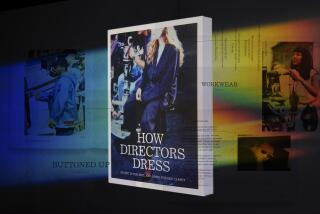Op-Ed: My life as a meme: How ‘Directed by Robert B. Weide’ signals satire
Humor me for a moment. Sit down at your computer or open your nearest mobile device and Google these words: “Directed by.” What’s the first predictive text that comes up? Martin Scorsese? Quentin Tarantino? Ingmar Bergman? Chances are the first name Google suggested was Robert B. Weide. That’s me. Sort of. So why is the most Googled director in the world someone you probably never heard of?
As they say on Facebook, it’s complicated.
In 1999, I produced and directed an HBO special called “Larry David: Curb Your Enthusiasm,” which spawned a cable series that recently completed its 10th season. A signature of the series is the final moment of each episode, when every conniving, self-serving move Larry has made over the previous half-hour results in an unexpected comic payback that explodes in his face like a revenge-seeking missile, after which the theme music, “Frolic” by Luciano Michelini, is boldly reprised. (We called it our Italian circus music.) Then the screen suddenly goes black. Because I directed most of the episodes during the first five seasons, a title card would usually appear reading “Directed by Robert B. Weide.”
To us, this final moment was based on the simple showbiz adage of going out on a laugh. But to many viewers, it’s come to represent the existential moment in all our lives when we realize that our best-laid plans are subject to complete failure, and we’re hit with karmic payback in the most spectacular and humiliating ways. At these moments, we are all Larry David. All that’s missing is the circus music.
“Sicko.” “Misanthropic moron.” “Freak of nature.” “Bona fide racist.”
A few years ago, an official Facebook “fan” page was created for me. For the first couple of years, it had a modest following of about 200 people, but last year, that following started growing exponentially. Curious as to why, the page manager posted a message, asking what was bringing people to the page. One follower’s concise response: “You’re part of a new video meme on the internet, basically any short but funny video with your credits rolling at the end.”
This response led me to Google “Directed by Robert B. Weide” and, sure enough, there were hundreds of videos of humiliating interactions, human error, stunts gone wrong, all followed by the “Curb” music and my directing credit.
As my followers and the videos continued to multiply, I pinned a disclaimer on my fan page, clarifying that I had nothing to do with these memes. It did no good. Countless posts were popping up, referring to me as the “Meme King.” Marriage proposals came my way as did inquiries for employment at my “studio.” I work from home.
Then came the threats from people insisting that I take down the plagiarized videos from the internet in which I had surreptitiously added my name to their work. (“You’d better take that video down before I get the proper authorities involved! I filmed it!”) Others would send me their videos and ask if I would “please add the famous credit.” This last demand was eventually met by a website called Curb Your Video, which allows anyone to attach the music and prized credit onto their videos.
In the last year, my Facebook fan page has gone from 200 loyalists to 90,000 very misguided meme fans.
A tiny cottage industry has even popped up in response to the memes. A few months ago, a friend emailed to simply ask, “Do you get a piece of this?” The message included a link to a site selling T-shirts emblazoned with “Directed by Robert B. Weide.” My wife soon ordered two. In the spirit of “If you can’t beat them, join them,” I posted a Facebook photo of me wearing the T-shirt, with the caption, “I don’t suppose this is going to help matters.” It didn’t. That photo has been viewed by close to 3 million people.
Meanwhile, there are countless Facebook pages and Instagram and Twitter accounts bearing my name and displaying the video memes. One “Robert B. Weide” Instagram account has 20,000 followers. I’m the actual guy, and I have 300.
Two popular memes currently making the rounds are related to the COVID-19 pandemic, bringing heightened personal meaning to the phrase “viral.” The first is a clip from the 2006 film “The Host,” directed by “Parasite” creator Bong Joon Ho. An Asian man stands on a street corner where his fellow pedestrians wear protective face masks. He pulls his down to clear his throat and expectorate into water puddled in the gutter, after which a bus races by, hits the puddle and sprays all the screaming pedestrians. Cue music. “Directed by Robert B. Weide.”
The other one is recent news footage in which a California public health official gives a speech warning people not to touch their face, nose or eyes. Before turning a page of her prepared text, she moistens her finger by dabbing it on her tongue. You already know what follows.
In recent weeks, both of these videos have been sent to me dozens of times via every form of digital communication. Even friends of mine are saying, “Hysterical. Well done!” or “Thanks for the laugh.”
After more than a year of offering the full explanation and back story, I’ve finally condensed my reply to five words: “Thanks! My best work yet.”
Robert B. Weide’s latest film, “Kurt Vonnegut: Unstuck in Time,” is scheduled to be released this year.
More to Read
A cure for the common opinion
Get thought-provoking perspectives with our weekly newsletter.
You may occasionally receive promotional content from the Los Angeles Times.










